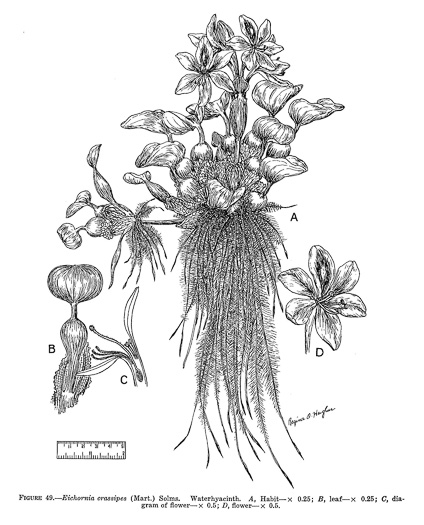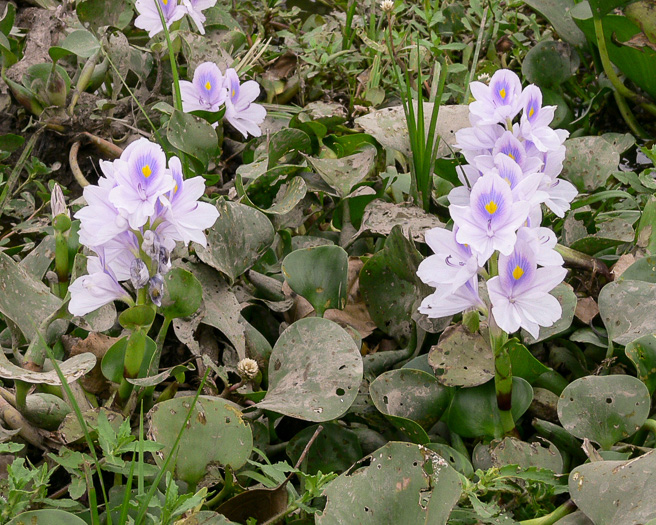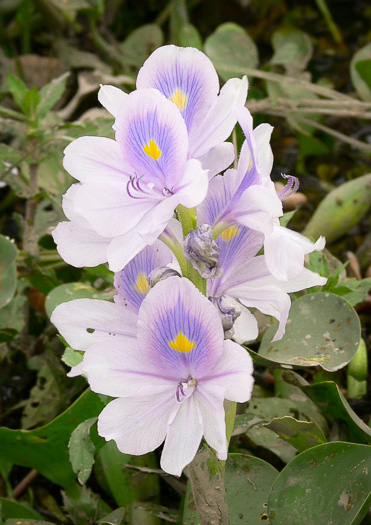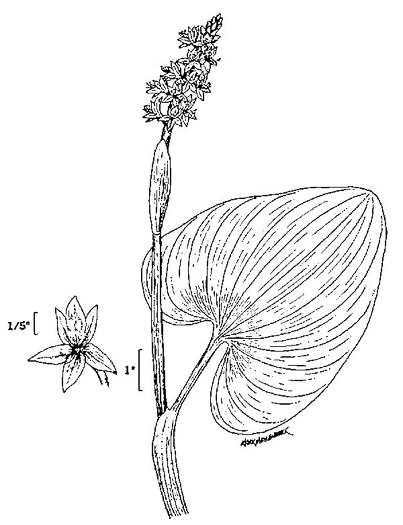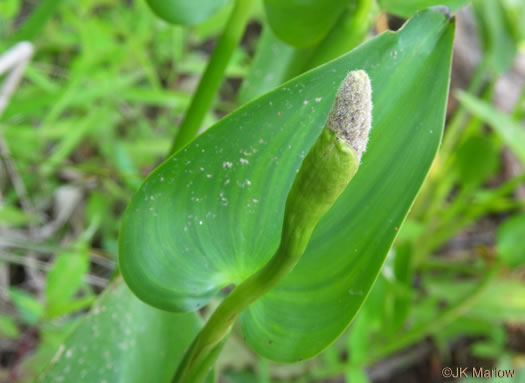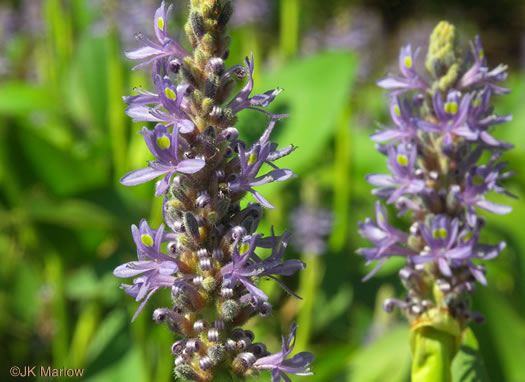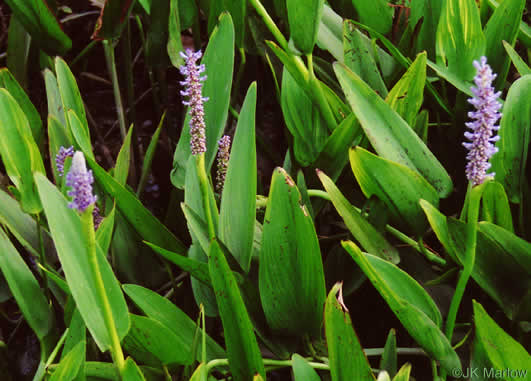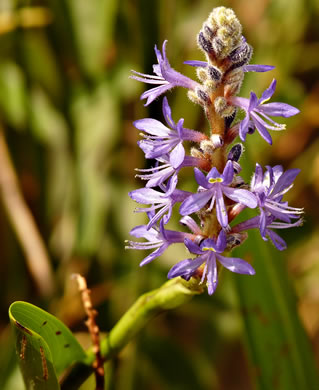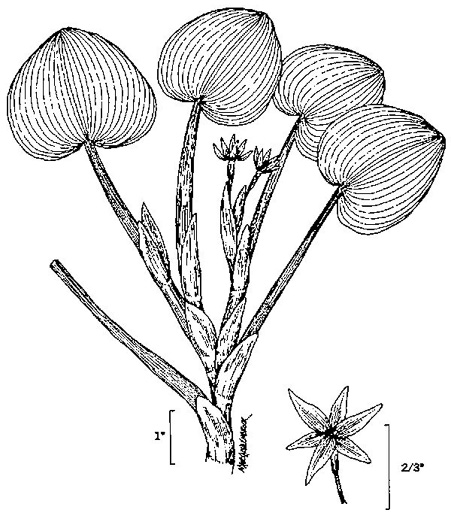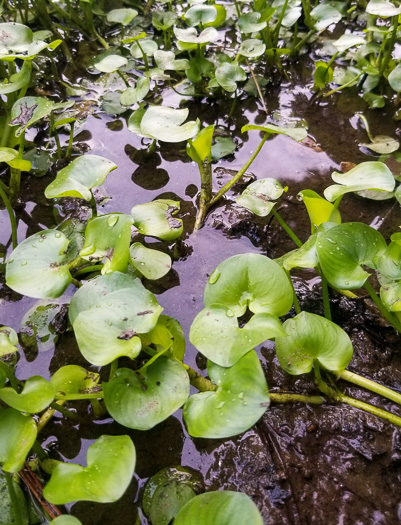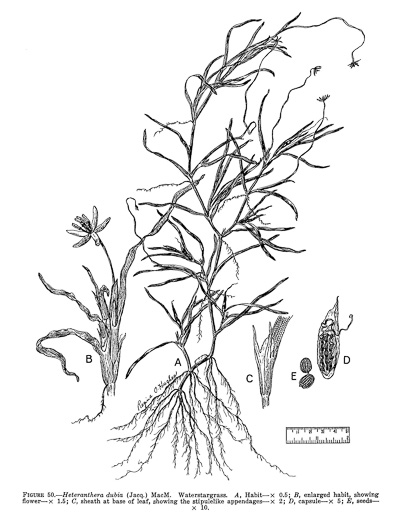Hovering over an image will enlarge it and point out features (works better on desktop than on mobile).
![]() A camera indicates there are pictures.
A camera indicates there are pictures.
![]() A speaker indicates that a botanical name is pronounced.
A speaker indicates that a botanical name is pronounced.
![]() A plus sign after a Latin name indicates that the species is further divided into varieties or subspecies.
A plus sign after a Latin name indicates that the species is further divided into varieties or subspecies.
Most habitat and range descriptions were obtained from Weakley's Flora.
Your search found 7 taxa in the family Pontederiaceae, Pickerelweed family, as understood by PLANTS National Database.

![]()
![]() Common Name:
Water-hyacinth
Common Name:
Water-hyacinth
Weakley's Flora: (4/24/22) Oshuna crassipes FAMILY: Pontederiaceae
SYNONYMOUS WITH PLANTS National Database: Eichhornia crassipes FAMILY: Pontederiaceae
SYNONYMOUS WITH Vascular Flora of the Carolinas (Radford, Ahles, & Bell, 1968): Eichhornia crassipes 039-01-001 FAMILY: Pontederiaceae
Habitat: Ponds, ditches, sluggish water
Uncommon in Coastal Plain but can be an aggressive aquatic weed (rare in Piedmont)
Non-native: tropical America

Common Name: Rooted Water-hyacinth, anchored water-hyacinth
Weakley's Flora: (4/24/22) Eichhornia azurea FAMILY: Pontederiaceae
PLANTS National Database: Eichhornia azurea FAMILY: Pontederiaceae
Habitat: Ditches, rivers
Non-native: southern Mexico to South America, and West Indies

![]()
![]() Common Name:
Heartleaf Pickerelweed, Wampee
Common Name:
Heartleaf Pickerelweed, Wampee
Weakley's Flora: (4/24/22) Pontederia cordata var. cordata FAMILY: Pontederiaceae
INCLUDED WITHIN PLANTS National Database: Pontederia cordata FAMILY: Pontederiaceae
INCLUDED WITHIN Vascular Flora of the Carolinas (Radford, Ahles, & Bell, 1968): Pontederia cordata 039-02-001 FAMILY: Pontederiaceae
Habitat: Swamps, seepage areas, marshes, pond-shores, lake-shores
Common in Coastal Plain, uncommon in Piedmont, rare in Mountains
Native to the Carolinas & Georgia

![]()
![]() Common Name:
Lanceleaf Pickerelweed
Common Name:
Lanceleaf Pickerelweed
Weakley's Flora: (4/24/22) Pontederia cordata var. lancifolia FAMILY: Pontederiaceae
INCLUDED WITHIN PLANTS National Database: Pontederia cordata FAMILY: Pontederiaceae
INCLUDED WITHIN Vascular Flora of the Carolinas (Radford, Ahles, & Bell, 1968): Pontederia cordata 039-02-001? FAMILY: Pontederiaceae
Habitat: Marshes, pond-shores, lake-shores
Common in GA Coastal Plain (uncommon in SC, rare in NC)
Native to the Carolinas & Georgia

![]() Common Name:
Kidneyleaf Mud Plantain
Common Name:
Kidneyleaf Mud Plantain
Weakley's Flora: (4/24/22) Heteranthera reniformis FAMILY: Pontederiaceae
SYNONYMOUS WITH PLANTS National Database: Heteranthera reniformis FAMILY: Pontederiaceae
SYNONYMOUS WITH Vascular Flora of the Carolinas (Radford, Ahles, & Bell, 1968): Heteranthera reniformis 039-03-001 FAMILY: Pontederiaceae
Habitat: In shallow, stagnant water in floodplains, or emersed on mud
Uncommon in NC Coastal Plain (rare elsewhere in GA-NC-SC)
Native to the Carolinas & Georgia

Common Name: Water Stargrass
Weakley's Flora: (4/24/22) Heteranthera dubia FAMILY: Pontederiaceae
SYNONYMOUS WITH PLANTS National Database: Heteranthera dubia FAMILY: Pontederiaceae
SYNONYMOUS WITH Vascular Flora of the Carolinas (Radford, Ahles, & Bell, 1968): Heteranthera dubia 039-03-002 FAMILY: Pontederiaceae
Habitat: Streams, rivers, lakes, reservoirs, especially in areas with calcareous substrates
Rare
Native to North Carolina

Common Name: Monochoria, heartshape false pickerelweed
PLANTS National Database: Monochoria vaginalis FAMILY: Pontederiaceae
Non-native
Your search found 7 taxa. You are on page PAGE 1 out of 1 pages.

